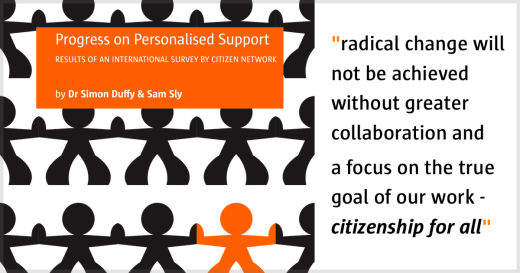3rd October 2017
An international survey on personalised support shows idea is spreading, but commissioning lags behind.
The Centre for Welfare Reform has published a major report which provides data from a major international survey on personalised support.
Personalised support means:
Some of the main conclusions that can be drawn from the survey include:
Dr Simon Duffy, one of the authors of the report said:
"There are models of flexible and personalised support for people with complex needs that are more than 25 years old, so it is shocking that progress in developing and sharing this model has been so extraordinarily slow. This failure to grow and develop may be partly caused by current commissioning models. Instead of encouraging values-based collaboration most support organisations seem to have been competing on price alone, whilst continuing to provide the same old models of institutionalised and semi-institutionalised support. It is time for a radical rethink of social care and disability support."
Sam Sly, the other author of the report said:
"That, in 2017, we are still having to write reports on the progress of personalised support is a somewhat depressing proposition, but a sad truth. Is not the person, people and personhood that our work is all about? Is it not who we are, and therefore what we want for every single one of our fellow human beings and citizens? This report is a useful insight into what we should be doing, where we have got to, and what still needs to be done, giving a fascinating insight, not only into the UK ,but also across the World. Read, pause to think and take the opportunity to go out and challenge those whose behaviour is preventing the opportunities of all to be the people they deserve to be."
The report was published on behalf of Citizen Network, which is an international cooperative to achieve citizenship for all. Citizen Network is now established in 10 different countries to help people and groups work together to support each other in their shared work to create a more inclusive world where everyone matters. The report was published in association with Choice Support, one of the Partners in Citizen Network and with support from NHS England.
